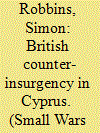|
|
|
Sort Order |
|
|
|
Items / Page
|
|
|
|
|
|
|
| Srl | Item |
| 1 |
ID:
116257


|
|
|
|
|
| Publication |
2012.
|
| Summary/Abstract |
The Cyprus Emergency is often lumped together with Malaya and Kenya as an example of British counter-insurgency practice in the 1950s. Malaya and Kenya in particular are often used as models of how to succeed. The general perception is that these counter-insurgency campaigns, which are often connected with the strategy of 'winning hearts and minds', were highly successful,1
and have 'become synonymous with the conduct of a successful counter-insurgency campaign',2 in contrast with the methods employed by the French in Indo-China and Algeria, the Dutch in Indonesia, the Portuguese in Angola and Mozambique, the Americans in Vietnam, and the Soviets in Afghanistan. However, Cyprus, which tends to be comparatively neglected and less studied, presents a far less rosy and more problematic picture of British counter-insurgency practices in the 1950s. The geography and politics of Malaya and Kenya make them unsuitable as a model for counter-insurgency operations in the very different situation in Cyprus between 1954 and 1959. Rather than the usual comparison with Malaya and Kenya, Cyprus should be seen in parallel not only with Palestine, Aden, and Northern Ireland but also with Portugal and Rhodesia.
|
|
|
|
|
|
|
|
|
|
|
|
|
|
|
|
| 2 |
ID:
174173


|
|
|
|
|
| Summary/Abstract |
This article aims to offer a valid answer to the question why Turkey’s official stance on the Cyprus problem experienced frequent shifts - from indifference (1950) into supporting colonial rule (1954) then into Taksim, or partition (1956) and, finally, into independence (1959). Drawing upon the main assumptions of neoclassical realism, it argues that the existing systemic explanations in the scholarly literature that focus on Cold War rivalry are insufficient to grasp why there were such remarkable shifts in Turkey’s Cyprus policy in the 1950s. Instead, the article will focus on the domestic dynamics to make better sense of these policy changes. Accordingly, it will first discuss the main assumptions of neoclassical realism as a sound theoretical framework. Second, it will scrutinise in detail how Turkey experienced such shifts in its Cyprus policy throughout the 1950s. Third, the article will discuss the extant literature that overwhelmingly concentrates on systemic explanations for Turkey’s volte-face in Cyprus. In response, the article will offer alternative explanations by focusing on Turkey’s depleting resource extraction capacity and the political leadership of Turkish Prime Minister Adnan Menderes, in order to fully understand the underlying reasons behind Turkey’s shifting Cyprus policy.
|
|
|
|
|
|
|
|
|
|
|
|
|
|
|
|
| 3 |
ID:
174174


|
|
|
|
|
| Summary/Abstract |
This article revises the narrative of the pre-independence troubles in Cyprus to take greater account of Anglo-Turkish interactions. Initial Turkish reluctance to play any role was overcome by the determination of Harold Macmillan as British Foreign Secretary after April 1955 to bring the country into the centre of the picture. The analysis underlines how, far from simplifying any solution, this intensified Turkish suspicions of the motivations behind British policy. These doubts came to pivot on the option of partition in any exercise of Cypriot self-determination. The end-game of Cypriot independence was characterized not by ‘Anglo-Turkish alliance’, but by a fragile Greco-Turkish understanding.
|
|
|
|
|
|
|
|
|
|
|
|
|
|
|
|
| 4 |
ID:
168368


|
|
|
|
|
| Summary/Abstract |
This article tries to shed light on Turco-British relations in the early Cold War era. It focuses on the two states’ cooperation in Middle Eastern defence, as well as their interactions with Egypt and Greece. Immediately after the Second World War, the Soviet Union and communism were accepted as common threats directed against Turkey, Greece, Britain, the entire Western camp and a broad range of Middle Eastern countries. Washington and London were in search of alliances with regional actors; however, due to the anti-Western attitudes of Egypt in particular, and the anti-Israeli attitudes of the Arabic realm in general, the West was not satisfied with the defence system established in the region. In regard to the relations between the four abovementioned states, while Turkey and Britain joined forces against the Egyptian cause in the Suez issue and the Greek cause on the Cyprus issue, Greece and Egypt sided with each other against the British positions.
|
|
|
|
|
|
|
|
|
|
|
|
|
|
|
|
|
|
|
|
|